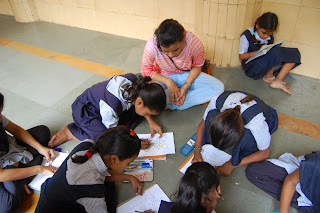 |
| George Bush at a Young Leaders' Summit. |
There has been a unmissable boom in youth related events, actions and organizations. Conferences, donation drives, NGOs and social service initiatives that are 100% founded and run by young persons are an extremely common sight, and what is even more evident is their inherent efficiency and success.
Many of these initiatives are by highly driven and motivated students from some of the best institutes across the country, who have the requisite support systems, ideas and verve to brainstorm solutions to current day and execute them. This can be seen in organizations like CACR itself, where we have tie-ups with students from social service cells of some of the finest colleges in Mumbai, as well as a tie-up with IIT-Bombay for the computer literacy programme.
Tapping into this potential is essential, especially from a social perspective. Majority of college and school students have summer holidays and vacations at this time, and again the vast majority of them have a desire to have a productive summer, making this the perfective time for undertaking such initiatives.
The only thing that is between the youth and making a difference is a direction.
The good news is that opportunities are abound for contributing to any cause that you hold dear. Not only can one try to start their own initiative with a couple of equally driven friends, or intern at an NGO, one can also volunteer with multiple NGOs over the course of months.
Not only is this is a highly productive and beneficial thing to do from a career and CV building perspective, but it imbues one with a sense of satisfaction and personal fulfilment. Realizing that you are a part of something that is larger than yourself, and incessantly dedicating your time, efforts and energy towards a social cause is something that is internally fulfilling and rewarding, and teaches you empathy and dedication, qualities that are highly admired and looked upon in today's day and time.
Additionally, in a time when the majority of students while away and waste the precious summer months, productively working toward a social cause is no mean feat, and definitely sets you apart!
So, what are you waiting for? Head to your nearest NGO now and make a difference.
- Anand Banerjee is a social media intern with CACR , a education non-profit based in Mumbai ,India.
CACR +Citizens Association For Child Rights works to improve the quality of education and health of school children in municipal (inner city) schools
www.ngocacr.com




